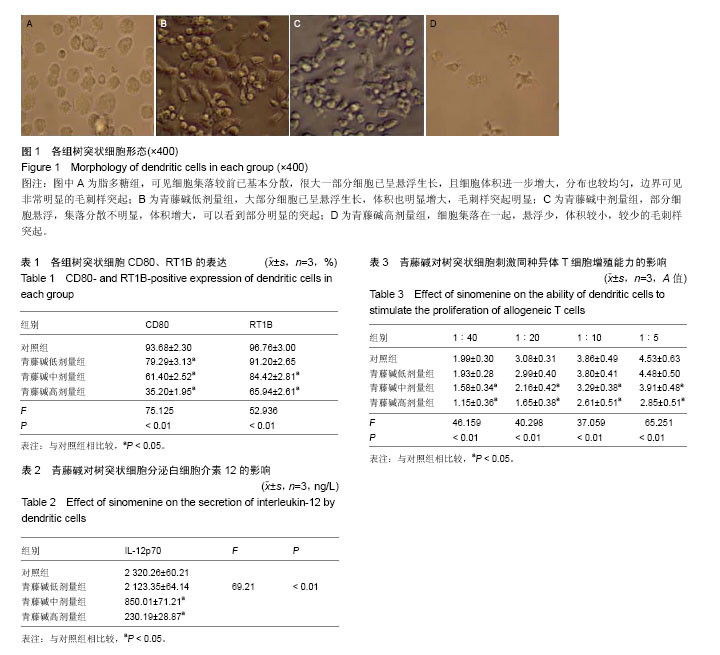| [1] Walunas TL, Lenschow DJ, Bakker CY, et al. CTLA-4 can function as a negative regulator of T cell activation. Immunity. 1994;1(5):405-413.[2] Banchereau J, Steinman RM. Dendritic cells and the control of immunity. Nature. 1998;392(6673):245-252.[3] Griffiths KL, O'Neill HC. Dendritic cells as immune regulators: the mouse model. J Cell Mol Med. 2008;12(5B): 1909-1914.[4] Adema GJ. Dendritic cells from bench to bedside and back. Immunol Lett. 2009;122(2):128-130.[5] Banchereau J, Briere F, Caux C, et al. Immunobiology of dendritic cells. Annu Rev Immunol. 2000;18:767-811.[6] Van Voorhis WC, Hair LS, Steinman RM, et al. Human dendritic cells. Enrichment and characterization from peripheral blood. J Exp Med. 1982;155(4):1172-1187.[7] Guermonprez P, Valladeau J, Zitvogel L, et al. Antigen presentation and T cell stimulation by dendritic cells. Annu Rev Immunol. 2002;20:621-667.[8] Merad M, Manz MG. Dendritic cell homeostasis. Blood. 2009; 113(15):3418-3427.[9] Solari MG, Thomson AW. Human dendritic cells and transplant outcome. Transplantation. 2008;85(11):1513-1522.[10] Steinman RM, Hawiger D, Nussenzweig MC. Tolerogenic dendritic cells. Annu Rev Immunol. 2003;21:685-711.[11] 江苏新医学院.中药大辞典(上册)[M].上海:上海科学技术出版社, 1982:1234.[12] 曹吉慧,赵桂森,冯延江.青风藤的化学成分与药理作用[J]. 现代药物与临床,2008,23(2):62-66.[13] 王文君,李红,杜群,等.青藤碱对 RBL-2H3 肥大细胞增殖凋亡以及活化脱颗粒的影响[J].免疫学杂志,2009,25(3):261-263.[14] Jiang Y, Gao M, Wang W, et al. Sinomenine hydrochloride protects against polymicrobial sepsis via autophagy. Int J Mol Sci. 2015;16(2):2559-2573.[15] Ju XD, Deng M, Ao YF, et al. Protective effect of sinomenine on cartilage degradation and chondrocytes apoptosis. Yakugaku Zasshi. 2010;130(8):1053-1060.[16] Vieregge B, Resch K, Kaever V. Synergistic effects of the alkaloid sinomenine in combination with the immunosuppressive drugs tacrolimus and mycophenolic acid. Planta Med. 1999;65(1):80-82.[17] Shu L, Yin W, Zhang J, et al. Sinomenine inhibits primary CD4+ T-cell proliferation via apoptosis. Cell Biol Int. 2007; 31(8):784-789.[18] Feng H, Yamaki K, Takano H, et al. Suppression of Th1 and Th2 immune responses in mice by Sinomenine, an alkaloid extracted from the chinese medicinal plant Sinomenium acutum. Planta Med. 2006;72(15):1383-1388.[19] Feng H, Yamaki K, Takano H, et al. Effect of sinomenine on collagen-induced arthritis in mice. Autoimmunity. 2007;40(7): 532-539.[20] Wang Q, Li XK. Immunosuppressive and anti-inflammatory activities of sinomenine. Int Immunopharmacol. 2011; 11(3): 373-376.[21] 王毅,宋珺,姜黎明,等. 青藤碱对肾移植大鼠移植肾组织肿瘤坏死因子-α和CD80的影响[J].中华实验外科杂志,2005,22(12): 1555-1556.[22] 杨庞,杨罗艳,罗志刚,等.青藤碱对肾移植大鼠T细胞亚群的影响[J].临床泌尿外科杂志,2003,18(10):620-622.[23] 王毅,陈正,熊烈,等.青藤碱对肾移植大鼠急性排斥反应及T细胞增殖的影响[J].中华实验外科杂志,2004,21(5):573-574.[24] 戴英波,黄循,罗志刚,等.青藤碱对大鼠肾移植急性排斥反应的抑制作用[J].中国现代医学杂志, 2004,14(11):49-54.[25] 秦国庆,王毅,姜黎明,等.青藤碱对肾移植模型大鼠外周血淋巴细胞穿孔素表达水平的影响[J]. 医学临床研究, 2006,23(11): 1746-1749.[26] Brenan M, Puklavec M. The MRC OX-62 antigen: a useful marker in the purification of rat veiled cells with the biochemical properties of an integrin. J Exp Med. 1992; 175(6):1457-1465.[27] Jiang H, Zhang Y, Yin X, et al. Construction and evaluation of rats' tolerogenic dendritic cells (DC) induced by NF-κB Decoy method. Afr Health Sci. 2014;14(3):626-633.[28] Weigel BJ, Nath N, Taylor PA, et al. Comparative analysis of murine marrow-derived dendritic cells generated by Flt3L or GM-CSF/IL-4 and matured with immune stimulatory agents on the in vivo induction of antileukemia responses. Blood. 2002;100(12):4169-4176.[29] van de Laar L, Coffer PJ, Woltman AM. Regulation of dendritic cell development by GM-CSF: molecular control and implications for immune homeostasis and therapy. Blood. 2012;119(15):3383-3393.[30] Cools N, Van Tendeloo VF, Smits EL, et al. Immunosuppression induced by immature dendritic cells is mediated by TGF-beta/IL-10 double-positive CD4+ regulatory T cells. J Cell Mol Med. 2008;12(2):690-700.[31] Sanecka A, Ansems M, Prosser AC, et al. DC-STAMP knock-down deregulates cytokine production and T-cell stimulatory capacity of LPS-matured dendritic cells. BMC Immunol. 2011;12:57.[32] Nagata A, Takezako N, Tamemoto H, et al. Soluble ST2 protein inhibits LPS stimulation on monocyte-derived dendritic cells. Cell Mol Immunol. 2012;9(5):399-409.[33] de Goër de Herve MG, Durali D, Tran TA, et al. Differential effect of agonistic anti-CD40 on human mature and immature dendritic cells: the Janus face of anti-CD40. Blood. 2005; 106(8):2806-2814.[34] Butts CL, Shukair SA, Duncan KM, et al. Progesterone inhibits mature rat dendritic cells in a receptor-mediated fashion. Int Immunol. 2007;19(3):287-296.[35] Liu K, Iyoda T, Saternus M, et al. Immune tolerance after delivery of dying cells to dendritic cells in situ. J Exp Med. 2002;196(8):1091-1097.[36] Trinchieri G. Interleukin-12 and the regulation of innate resistance and adaptive immunity. Nat Rev Immunol. 2003; 3(2):133-146.[37] Kuipers H, Heirman C, Hijdra D, et al. Dendritic cells retrovirally overexpressing IL-12 induce strong Th1 responses to inhaled antigen in the lung but fail to revert established Th2 sensitization. J Leukoc Biol. 2004;76(5): 1028-1038.[38] Steinman RM, Nussenzweig MC. Avoiding horror autotoxicus: the importance of dendritic cells in peripheral T cell tolerance. Proc Natl Acad Sci U S A. 2002;99(1):351-358. |
.jpg)

.jpg)